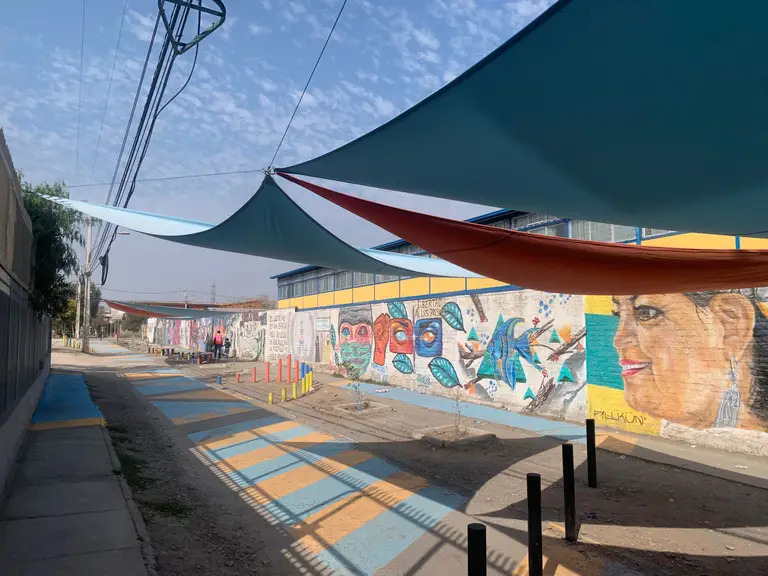Image credit: Automóvil Club de Chile
Information extracted from original article in online publication latercera.com – click here for the article in Spanish
The Star Rating for School programme will be executed by Automóvil Club de Chile (ACC) and the first intervention will be carried out in a school in the Lo Espejo commune, as part of a project to implement 200 school road safety improvements throughout the country in five years.
A huge problem at the global level is that of road crashes. The figures are truly terrifying, in fact, according to data provided by Conaset, injuries caused by road accidents are the main cause of death for children and young adults between the ages of 5 and 29. It is estimated that 500 children die daily in preventable traffic accidents, every 24 seconds there is a death on the roads, and every 4 minutes a child is involved.
These numbers must fall significantly. For this, there are various plans and programmes that seek to rectify this true pandemic. The club has formalised the implementation of SR4S with the aim of preventing the occurrence of road crashes in the vicinity of schools and kindergartens.
As explained by María Ignacia González, Executive Director of the Automóvil Club de Chile, “Chile owes a great debt to child road safety, even more so when in the last decade close to 37% of the children and adolescents who died on the roads were pedestrians. This project not only evaluates and communicates the dangers to which a school community is exposed, but also provides fast and effective solutions to the establishments and communes where they are inserted so that there are urban radios capable of guaranteeing safe mobility for children and Adults”.
The Executive adds that “to carry out the interventions, the characteristics and attributes of the school zone are first evaluated, such as vehicle flow, speeds, lighting, pedestrian crossings, signage, demarcations and other elements of the infrastructure that can put safety at risk. of those who move daily in the place. Once these hazards are investigated, the information analysed and the most effective and site-appropriate solutions are identified, leading to the implementation of road improvements. This process can last between two and three months in total, and it does not have any cost for the schools or for the communes”.
The plan starts in Lo Espejo
Within the framework of the National Pact for Road Safety, Conaset with the support 3M and ACC, is implementing improvements in school environments located, initially, in the communes of Lo Espejo, Maipú and Puente Alto, in the Metropolitan Region.
The first step with a pilot plan for the “Star Rating for School” programme began in Lo Espejo, a commune that has a rate of 116 accidents per 100,000 inhabitants, which is why the surroundings of 16 public establishments will be intervened.
The school chosen was the Hernán Olguín Maibeé school, located on Cardenal Silva Henríquez avenue, the main artery of the commune, and next to the Mapu Weñe kindergarten.
The project will be executed by the Automóvil Club de Chile, seeking to identify the dangerous situations to which minors are exposed in their school environments, in order to implement different road solutions that prevent run-overs and traffic incidents in schools and kindergartens.
With an investment of close to US$ 20,000, and thanks to the technical coordination of Conaset, new pedestrian crossings were created in three months of work, the Pegado passage, which was being used mainly for vehicle traffic, was enabled as a pedestrian path. Poles were installed in the immediate vicinity to control student entry and exit access, and recreational and rest areas were distributed for those who regularly pass through the school environment.
The intervention considered the installation of furniture and signage to improve the safety of pedestrians, students, parents and caregivers, as well as painting and the installation of permanent awnings.
According to the projections of the Automóvil Club de Chile, at the end of the first semester it is expected to intervene at least six educational establishments in the Metropolitan Region, and during the second half of the year the intention is for this international initiative to expand to regions, mainly in those communes with high rates of road crashes.
“The great advantage of this programme is that it is sustainable over time. It not only measures the level of safety before the intervention, but it is also done after having executed the road improvements, which allows the school and the commune to monitor over time whether the changes introduced are fulfilling their objective and/or if they should change at some point. If we want this type of initiative to grow and be validated in Chile, the commitment of both the public and private sectors is required. This is how this programme has been able to be successful internationally”, said María Ignacia González of Automóvil Club.
The next road safety interventions will be carried out at the Las Vizcachitas School and the Pequeños y Pequeñas Artistas Garden, both in the Puente Alto commune.

